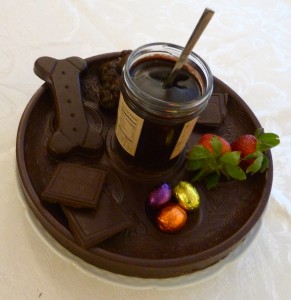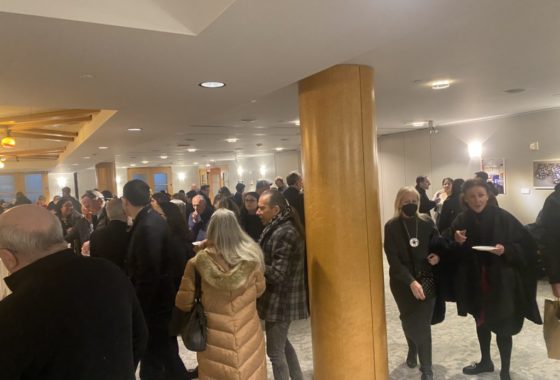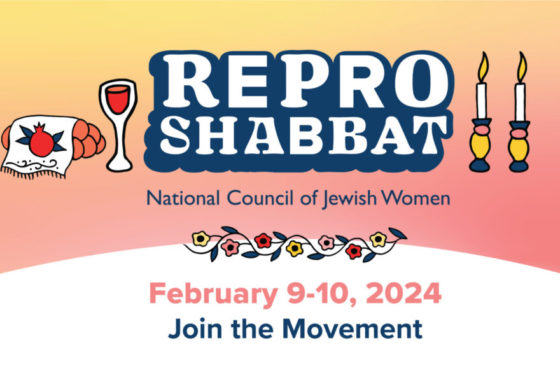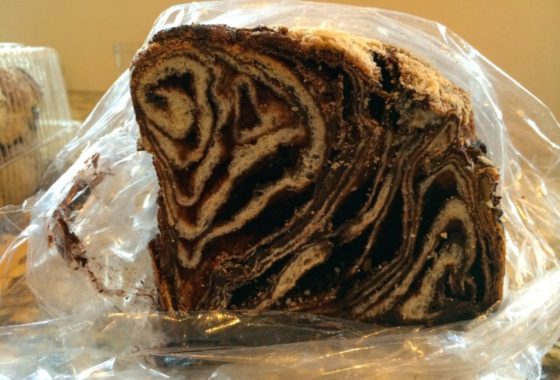What Makes This Chocolate Different From All Other Chocolate?
Kosher L’Pesach certification does nothing to improve the quality of the chocolate for the festival celebration and actually limits choices, increases costs, diminishes taste and undermines the powerful messages of the Chag. While Passover themed chocolate in the shape of matzah or the Seder plate or other Jewish symbols may enhance the décor of the Seder table, the Pesach hechsher does not necessarily make it the optimal Pesach treat as it certifies only that the chocolate has not been contaminated by chametz leavening. Admittedly for some markets that is absolutely enough.

Chocolate Seder Plate
Unfortunately, Kosher for Passover chocolate also unnecessarily divides Ashkenazim (Jews descended from Western Europe) and Sephardim (Jews descended from Spain). The Ashkenazi prohibition against eating kitniyot (literally “little things”) including legumes during Passover precludes the accepted use of soy lecithin as an emulsifier to make the chocolate smooth.
This prohibition does not apply to cocoa beans or coffee beans as they grow on bushes and trees and do not fall into the legumes category. Maxwell House Coffee developed its freebie Haggadah in 1932 in order to maintain its Jewish market during Pesach, reminding Jews through this marketing ploy that coffee beans may be consumed during Pesach. Maxwell House acquired Kosher L’Pesach certification for its coffee in 1923.
However, Sephardi custom permits kitniyot and thus the soy additive. This culture war between Sephardim and Ashkenazim with separate certification systems in Israel boils at Pesach when observant Ashkenazim in some communities are forbidden to enter the homes of Sephardim lest they be misled or tempted into eating kitniyot. Chocolate should not further that Pesach dissension.
Given that the pricier Pesach hechsher that divides the Jewish people over the soy additive does nothing to further the quality of the chocolate, the value of the Passover chocolate certifications does little to ameliorate other serious ethical concerns related to chocolate, particularly child labor and slave labor farming of chocolate.

Some advocates for kashrut prefer to separate the hechsher from food ethics, hesitating to conflate the two. The move to create ethical oversight for producers and purveyors of kosher food in general has taken the form of initiatives such as:
1. Uri L’Tzedek “an Orthodox social justice organization dedicated to combating suffering and oppression”; its Tav HaYosher certification that kosher restaurants in New York are safe work environments and pay fair wages.
2. In Israel Bema’aglei Tzedek “a pioneer in the field of Social Kashrut, offers the Tav Chevrati seal of approval granted free of charge to restaurants and other businesses that respect the legally-mandated rights of their employees and are accessible to people with disabilities.”
3. And, Magen Tzedek “kashrut for the 21st century… the world’s first Jewish ethical certification seal, synthesizes the aspirations of a burgeoning international movement for sustainable, responsible consumption and promotes increased sensitivity to the vast and complex web of global relationships that bring food to our tables.”
This year’s Pesach chocolate should be different: organic, fair trade, fulfilling the ethical values of the holiday.
3 thoughts on “What Makes This Chocolate Different From All Other Chocolate?”
Leave a Comment
Recent Posts
-
Sweet Treat: Chocolate and the Making of American Jews
You may wonder: how did chocolate help define American Jews? Through chocolate, we see that Jews were part of America since its earliest days. Well, since 1701 at least, Jews in the Colonies made part of their living through chocolate. Several Sephardim, leaders of their New York and Newport Jewish and secular communities, participated in
Read more › -
How About Some Uterus Challah?
When Logan Zinman Gerber felt enraged about the loss of reproductive rights in the U.S., she baked challah. Not any challah. She shaped it into a uterus. It wasn’t long after the birth of her daughter that Gerber, a longtime challah baker and staff member of the Religious Action Center of the Reform movement, considered
Read more › -
A Manhattan synagogue explores the rich, surprising history of Jews and chocolate
I’m grateful for this story written by Rachel Ringer, published at JTA/NY Jewish Week on December 20, 2023: (New York Jewish Week) — In 2006, Rabbi Deborah Prinz was on a trip to Europe with her husband, Rabbi Mark Hurvitz, when they wandered into a chocolate shop in Paris. While meandering about the store, Prinz picked
Read more › -
Exhibit Opens! Sweet Treat! Chocolate & the Making of American Jews
Sweet Treat is a delicious gastronomic adventure into the history and resilience of American Jewish chocolate making. This exhibition invites you to follow the chocolate trail to America, a scrumptious journey through time and place. Chocolate gives us a lens to understand Jewish migration, as the chocolate trade parallels the migrations of the Jewish
Read more ›
Some Previous Posts
(in alphabetical order)
- "Boston Chocolate Party" Q&As with Deborah Kalb
- 2022 Media for The "Boston Chocolate Party"
- About Rabbi Deborah Prinz
- Baking Prayers into High Holiday Breads
- Boston Chocolate Party
- Chocolate Chip Politics
- Digging into Biblical Breads
- For the Easiest Hanukah Doughnuts Ever
- Forthcoming! On the Bread Trail
- Funny Faced Purim Pastries
- Good Riddance Chameitz or, The Polemics of Passover's Leaven
- Injera*
- Israeli Chocolate Spread
- Jewish Heritage Month: Baseball & Chocolate!
- Matzah - But, the Dough Did Rise!
- Plan a Choco-Hanukkah Party: 250th Anniversary Tea Party
- Prayers Into Breads
- To Shape Dough: A Trio of Techniques
- Why Is Challah On My Matzah Box?




Dear Rabbi Prinz,
I read the article about the Chocolate Seder in the Yiddish Forverts and I am very glad to see you mention slave and child labor on the cocoa plantations and that you mention Fair Trade chocolate. However, if we are to take our Judaism seriously, it is imperative to make this issue first in our consciousness whenever we talk about the relationship of Jews to chocolate.
About 6 years ago, I was visiting a rabbi friend shortly after I became aware of slavery on the cocoa plantations. She offered hot chocolate and reassured me that it was kosher, “it has a hekhsher” she told me. Almost without thinking, I replied, “does it have a Fair Trade hekhsher?” From that moment, I was committed. I have refused to eat or buy any chocolate unless it is certified Fair Trade, something not easy for a chocoholic. But then, no harder than refraining from bread on Peysakh or any food at all on Yom Kippur. Really, no harder than taking being a Jew seriously.
In fact, it’s not that hard at all, given a little planning, because you can find Fair Trade, kosher chocolate from a number of sources, and it’s usually organic and better tasting than the ordinary stuff. For Peysakh, Fair Trade and kosher but not certified kosher l’Peysakh was good enough for me as long as I read the ingredients and didn’t find any grains in the list.
But just a few days before Peysakh, I got an email from a friend announcing that Equal Exchange, which has for a long time produced kosher, Fair Trade, organic (and I might add wonderful) chocolate has now received certification as kosher l’Peysakh. I ran to my local coop and bought up a supply that would last for 3 seders and for the rest of the week as well. Here’s what I said when breaking it out at the seder:
This is the chocolate of freedom! How can one celebrate the festival of freedom with chocolate produced by slave labor? In fact, how can chocolate produced with slave labor be considered kosher at all? Kosher Fair Trade chocolate has been available for several years, but now: KOSHER FOR PEYSAKH! Please spread the word.
Rabbi Menachem Creditor wrote this inspiring kavanah:
Every generation learns that things are more than they seem. This chocolate I hold is more than just chocolate. This is a symbol of potential freedom, a realization that foods that give me delight can be made without child labor. Joy need not be accompanied by pain or oppression. May I experience the sweet flavor of this gift as a hint of the freedom that birthed it. May the world know liberation, one person at a time, mindful act by mindful act, until all people are free.
Other Fair Trade Passover Resources can be found here:
Fair Trade Judaica
fairtradejudaica.org
Thank you!